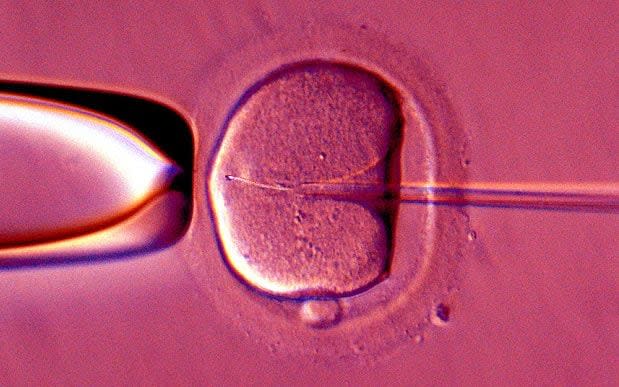IVF children at far greater risk of dangerous high blood pressure, study suggests

Children born through IVF are six times more likely to suffer high blood pressure than naturally conceived children, putting them at greater risk of heart attacks and strokes, new research suggests.
In a study of 96 youngsters, researchers in the Switzerland found one in seven teenagers who were born through assisted reproduction had clinically high blood pressure by the age of 16, compared with just 2.3 per cent of those born naturally.
Around 20,000 babies are born through IVF in Britain each year. But the oldest test-tube baby - Louise Brown - is only 40 years old, so the long term impact of fertility treatment is still unknown.
The researchers warned that the results showed ‘serious signs of concern’ that IVF youngsters were at increased risk of cardiovascular problems which can lead to heart attacks and stroke.

“The increased prevalence of arterial hypertension in (IVF) participants is what is most concerning,” said lead author Dr Emrush Rexhaj, director of Arterial Hypertension and Altitude Medicine at University Hospital in Bern.
"There is growing evidence that assisted reproduction alters the blood vessels in children, but the long-term consequences were not known. We now know that this places children at a six times higher rate of hypertension than children conceived naturally."
Researchers also discovered that all IVF teenagers in the study had average higher systolic and diastolic blood pressure - 119/71 mmHg versus 115/69, respectively - the measure of pressure when the heart is contracting and between beats.
Researchers had monitored the same youngsters five years before and found no difference in blood pressure.
"It only took five years for differences in arterial blood pressure to show," added Dr Rexhaj said.
"This is a rapidly growing population and apparently healthy children are showing serious signs of concern for early cardiovascular risk, especially when it comes to arterial hypertension."

In an accompanying editorial in the Journal of the American College of Cardiology Dr Larry Weinrauch, of Mount Auburn Hospital, said the problem may be even worse because children born as result of a multiple birth or whose mothers suffered problems in pregnancy were excluded from the study.
“We need to be vigilant in the development of elevated blood pressure among children conceived through ART to implement early lifestyle-based modifications and, if necessary, pharmacotherapy,” he added.
However IVF expert Professor Alastair Sutcliffe, of University College London, said fertility treatment may not be to blame for increased high blood pressure: "The young adults measured were not representative of the original group studied when they were younger as children, furthermore the study relied of a single blood pressure measurement.
"One swallow does not launch a summer and whilst I laud the efforts to monitor health, this should be done on a population basis not with small biased studies like this one.”
Yet others warned the study showed that IVF may have long term effects. Prof Tom Fleming, Emeritus Professor in Developmental Biology, University of Southampton, said: Because IVF as a clinical treatment for infertility has only been around for 40 years, the bulk of children born have not reach adulthood and middle age when cardiovascular conditions would normally become apparent, so more evidence may become available in future years.
“From a biological perspective, the early embryo is known to be sensitive to environmental conditions that may alter how it develops, affecting later gene expression and physiological condition, and may lead to changes such as hypertension."
Dr Yutang Wang a Senior Lecturer at the University of Australia, said: “Fertility treatments involve the manipulation of early embryos at a time when they may be particularly vulnerable to external disturbances.
“Mice generated by IVF have a shortened lifespan compared with control mice. Whether this is the case in humans remains unknown.”